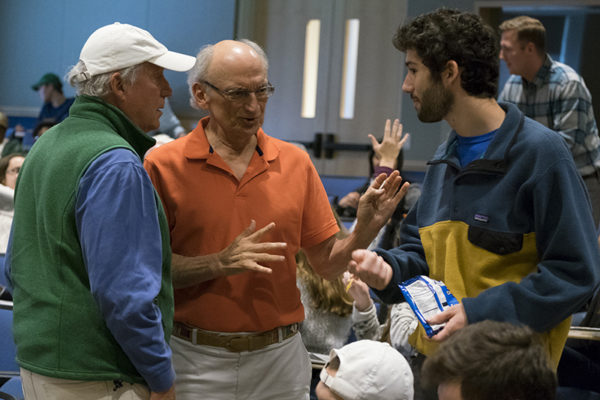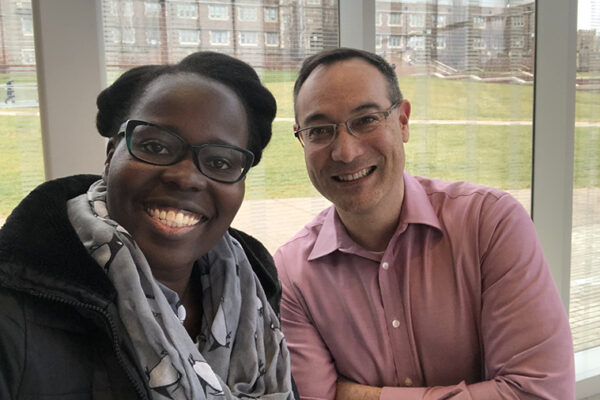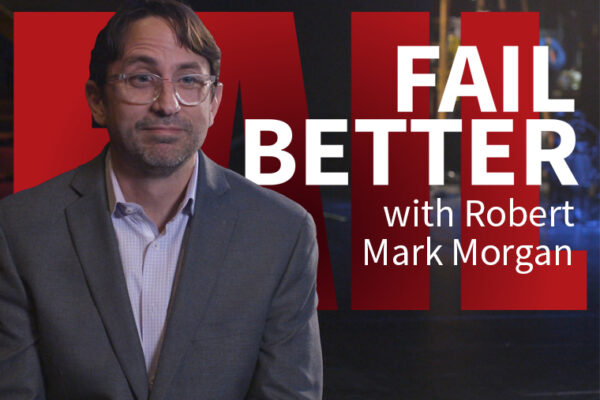Just six months ago, the Beyond Boundaries Program, the interdisciplinary, innovative study program for Washington University in St. Louis undergraduates, was in full swing, in the first academic year of its first cohort.
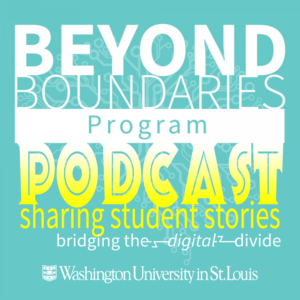 The group of 32 — the “first astronauts” — had matriculated at the university in fall 2019 not affiliated with any one school as a traditional WashU undergrad would be. The first-year students had applied to, and were accepted into, a two-year study of coursework that enables them to explore complex challenges that require investigation across disciplines.
The group of 32 — the “first astronauts” — had matriculated at the university in fall 2019 not affiliated with any one school as a traditional WashU undergrad would be. The first-year students had applied to, and were accepted into, a two-year study of coursework that enables them to explore complex challenges that require investigation across disciplines.
Beyond Boundaries Program students choose from a framework of classes, each taught by two or more faculty from all seven schools, and, in turn, are asked as first-years not what they want to be “when they grow up,” explained Rob Morgan, program director, but what problems do they want to solve — their “big questions,” as the program refers to them.
Then, in March 2020, you-know-what happened. Like everything at the university, COVID-19 stopped the cohort’s momentum in its tracks. Students left for spring break and didn’t return to campus for the remainder of the semester, leaving behind classes to attend, projects to promote and big questions temporarily put on hold.
Enter Morgan, in his 10th year at WashU, where he is a teaching professor of design in the Performing Arts Department in Arts & Sciences. The show must go on, right?
“We had so much wonderful community building with that cohort,” he said, “and we didn’t want to lose that.” Morgan knew that Beyond Boundaries Program students were inquisitive and adaptable, “the most comfortable with ambiguity and uncertainty.”
The show did go on. Embracing resiliency — and the creativity that is the very nature of Beyond Boundaries — Morgan and the program pivoted with podcasts — 24 of them in 18 weeks’ time.
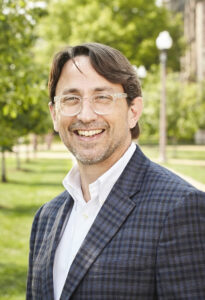
“We’d been touting the cohort as a group of students who are OK with tackling societal challenges, and we were literally living inside of one at that moment,” he said. So Morgan put out the call to students and faculty and began producing a series of podcasts that took a deep dive into the very best of the program: the students and collaborative faculty; the students’ creative work; and the interdisciplinary courses at the same time.
“The podcasts were a way to bridge this digital divide and that sense of isolation that people were feeling,” Morgan said. “I like to joke that we purposefully planned them to be 30-minutes long — roughly the length of a dog walk … depending on the stamina of your dog.”
With no prior experience in podcasting, Morgan asked for advice from colleagues near and far and taught himself the technical aspects of producing a podcast, including editing and posting. “I’m a designer and so I’m always doing things that scare me,” said Morgan, who has designed everything from theater sets in San Francisco and St. Louis, to theme-park rides in Russia, to sea lion shows at SeaWorld San Diego. “There was a learning curve, but I enjoyed it,” he said.
He also began researching subjects. The show debuted March 26 with Rebecca Messbarger, contributor to the Medical Humanities Program and professor of Italian in Arts & Sciences. In it, she and Morgan discussed pandemics, teaching philosophy and her Beyond Boundaries course, “Art of Medicine,” which she co-teaches with Patricia Olynyk, the Florence and Frank Bush Professor of Art at the Sam Fox School of Design & Visual Arts. “I told Rebecca upfront, ‘I don’t really know what I’m doing so if this goes online, it will be a miracle,’” Morgan said.
But it did, and 23 more followed this summer with faculty and students alike, and the affable Morgan behind the microphone. “Maybe it’s the Italian in me,” he said, “but I find everybody fascinating, and not just who they are, but what they do.”
Among the rising second-year students featured in the podcasts were Jenna Rogge, who is combining engineering courses with art to design prosthetics for children; Liam Dai, who is studying urban planning and business and organizes miles-long walking tours of St. Louis for his classmates so they can witness some of the issues the city is facing; and Juli Aronson, who talked about her love of animals and her study of anthropogenic climate change, which involves courses in math, anthropology, environmental and political science. “It was the first podcast with live chickens in the background,” Morgan said.
‘The podcasts were a way to bridge this digital divide and that sense of isolation that people were feeling.’
-Rob Morgan
Faculty talked about their classes and their personal lives, offering a glimpse into how they were surviving the pandemic. At the end of each faculty interview, Morgan always finished with the question, “What would you tell your first-year self if you could? What advice would you give yourself in the past?”
And the podcast featured an interview with Jill Stratton, before she left the Office of Student Affairs to join Vanderbilt University. Morgan said it was one of the most popular episodes — almost as popular as the “dean of joy” herself.
The podcasts are filled with personal stories and advice, with restaurant recommendations and gardening tips — all with the backdrop of the pandemic. In short, they covered a microcosm of life at WashU in the summer of 2020.
“The students were amazing,” Morgan said, “continually showing us that they can adapt.”
‘Listen louder than you sing’
Morgan, who is a bit of a Renaissance man when it comes to trying (and failing at) new things, was one of the founders of a Beyond Boundaries class which joined a series of interdisciplinary courses for first-year students in 2014.
“I was watching a Sidney Pollack documentary on one of my heroes, architect Frank Gehry,” Morgan said. “It blew my mind that Gehry had the same anxieties and fears about a blank page as I do as a theater artist. It validated things for me and taught me that it’s OK to be scared. It’s OK to not know. And so that led to this idea that ‘Well, wouldn’t it be great to talk about creativity across schools?’”
About the same time, then-Provost Holden Thorp opened up “Bring Your Own Idea” faculty group discussions encouraging interdisciplinary collaboration. Morgan said he worked with then-Vice Provost Marion Crain, the Wiley Rutledge Professor of Law, and pitched an idea on teaching creativity across schools to first-year students.
That class, “Designing Creativity,” is co-taught by Bruce Lindsey, the E. Desmond Lee Professor for Community Collaboration in the Sam Fox School of Design & Visual Arts, and was among the first that came out of the faculty group discussions. It continues as one of 10 Beyond Boundaries courses that any first-year student can take — and sparked the idea for the first program cohort. The courses explore the study and practice of the creative process across disciplines, from neuroscience to engineering to the performing arts.
The success of that class and others like it begat the Beyond Boundaries Program that was designed over a period of years before that first cohort arrived in 2019. The careful planning and execution was important. “We wanted to make sure that that first cohort became the standard-bearers for those classes that come behind them,” he said. “They are an amazing group, who look out for each other, and now look after the first-year students, too.”
The podcasts continue as Morgan and the faculty in the program prepare for students to return and the semester to start in mid-September. But Morgan now has podcasting skills in his toolbox and will use them in his own teaching this semester, making podcasts of lectures and assigned readings. “It seems like such a simple thing, but it gives students a new way to engage in the content, and I can pause and interject my own opinion or comments and laugh at my own jokes like I do in class,” he said.
The creative sparks still fly, and Morgan will continue to ask of his subjects — and himself — “What would you tell your first-year self?”
His favorite answer came this summer from the Rev. Callista Isabelle, director for religious, spiritual and ethical life on campus. Isabelle recounted for Morgan advice she once got from a choir director:
“It was from a choir teacher of hers who said, ‘You should listen louder than you sing,’” Morgan said, “And I was like, ‘Wait, wait, wait. Let’s talk about that quote!’ That’s applicable to life — and so true.”
To listen to Isabelle’s or any of the Beyond Boundaries podcasts, visit the podcast website.
WashU Response to COVID-19
Visit coronavirus.wustl.edu for the latest information about WashU updates and policies. See all stories related to COVID-19.
